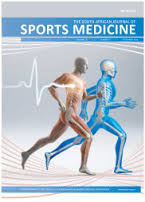Analysis of goalkeepers’ game performances at the 2016 European Football Championships
DOI:
https://doi.org/10.17159/2078-516X/2020/v32i1a8283Abstract
Background: Despite a substantial body of literature on the physical and technical demands of outfield players in football, there is little information regarding the performance of goalkeepers.
Objective: The aim of this study was to analyse the game performance profiles of goalkeepers at the 2016 European Football Championships.
Methods: A total of 30 goalkeepers from 15 games played during the 2016 European Football Championships were analysed using the InStat® video tracking system.
Results: The results showed that goalkeepers covered a mean total distance of 4819 m, ranging from 4036 m to 6640 m. Overall, 68% of distance travelled was attributed to walking, whereas 0.8% was due to high-intensity activities. The goalkeepers of teams that lost matches covered significantly (p < 0.05) longer distances while sprinting than those of teams that drew or won the matches. Goalkeepers of teams that drew significantly (p < 0.05) had a greater number of passes than those goalkeepers of teams that won or lost.
Conclusion: The current results have implications for soccer coaches to structure training sessions and tactical strategies for goalkeepers. The ability of goalkeepers to meet the physical and technical demands of a match could directly influence the successful execution of skills and the outcome of the competition.
Downloads
Downloads
Published
Issue
Section
License
The South African Journal of Sports Medicine reserves copyright of the material published. The work is licensed under a Creative Commons Attribution 4.0 (CC BY 4.0) International License. Material submitted for publication in the South African Journal of Sports Medicine is accepted provided it has not been published elsewhere. The South African Journal of Sports Medicine does not hold itself responsible for statements made by the authors.
How to Cite
- Abstract 1110
- PDF 1149





.png)